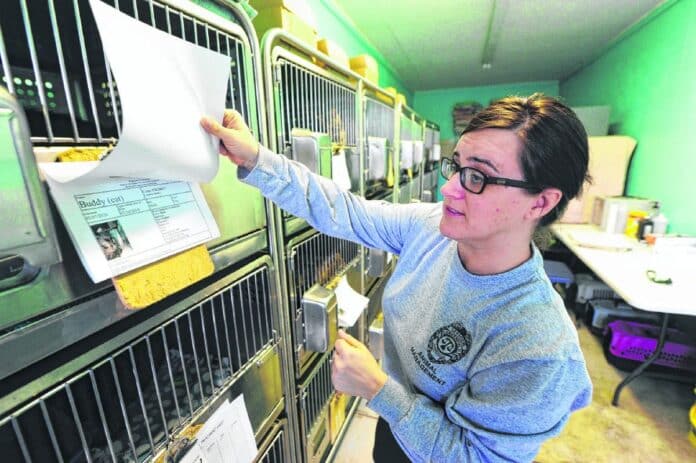
GREENFIELD — After a long dispute, Hancock County and the city of Greenfield have come to a possible agreement on how much the county will pay to help fund Hancock County Animal Management.
The county commissioners agreed to pay $350,000 for the operation of the department, which responds to calls about animal welfare as well as sheltering unwanted dogs and cats. A contract for the amount will be drawn up by the county’s lawyer and reviewed by the city’s lawyer before being signed.
The amount is more than the commissioners wanted to pay in 2019, when they voted to cut their share of support from $383,857 to $195,000. The amount, they said at the time, more accurately represented the level of services the department provides outside the city.
Greenfield went into the 2020 budget year without an agreement on how much the commissioners would pay, but they ultimately contributed 50% of the budget, about $375,000.
For 2021, commissioner John Jessup said in August, they hoped to spend no more than $300,000.
Though the amount is more than the county planned to contribute, it’s less than what the city was hoping for. Greenfield Mayor Chuck Fewell, who attended the commissioners’ meeting on Tuesday, Sept. 29 to discuss the issue, said he wanted to see the 50-50 split continue.
“We want to continue to provide for the county, and to enjoy the county relationship that was possible. We need that to move forward,” Fewell said. “We would like to see it continue at the 50-50 ratio, and to move it forward at that ratio.”
Animal management is operated as a department of the City of Greenfield, which approves its budget, but it serves all of Hancock County. In August, the Greenfield City Council approved a budget for the department that is identical to the 2020 budget, at $750,373, without resolving the matter with the county commissioners.
In the past, the county has paid 60% of the cost and the city has paid 40%.
Fewell said calls that come from outside the city have a major impact on operations of animal management and that the county offering inadequate funding would have led to a possible reduction in size, capacity and personnel. It would also have impacted towns within the county, since the commissioners have been paying for all areas outside of Greenfield.
County Commissioner Brad Armstrong objected to the way funding for the department has been decided in past years.
“We have no control over the budget cycle,” Armstrong said. “…You’re a vendor for us, providing a service.”
Armstrong also said that the expense for the county, which had been relatively stable until 2016, began increasing rapidly at that point from a $240,000 expense to what would be, if the county continued to pay 60%, a $400,000 commitment.
The county covers a wide variety of areas, Armstrong said, from densely populated to very rural, and it might make more sense for each municipality to set its own rules and contract separately for animal management services in the future.
Animal management director Amanda Dehoney said the increasing population of the county is a contributor to the increased expenses of the department. She said that residents’ lack of familiarity with local ordinances and weather extremes can also contribute to spikes in calls.
Ultimately, Fewell and the commissioners agreed that a one-year contract for the county to pay $350,000 was something they could all live with. This would only apply to the upcoming budget year, and the amount could be re-negotiated for 2022.
Fewell said he thought the conversation with the commissioners went well, although he was hoping they would agree to a longer-term contract.
“The amount we’re looking at right now looks very close to what we need,” Fewell said.
Animal management is set to move into a new home in late 2021, to be built on a plot of land west of Franklin Street and near the Hancock County 911 center that the city purchased from pharmaceutical company Covance.
Before then, however, it will have to move from its current location to accommodate the construction of the city’s new wastewater treatment plant. Fewell said the city is in the process of negotiating with the owner of a building that could be leased as a temporary home for the department for about a year.
